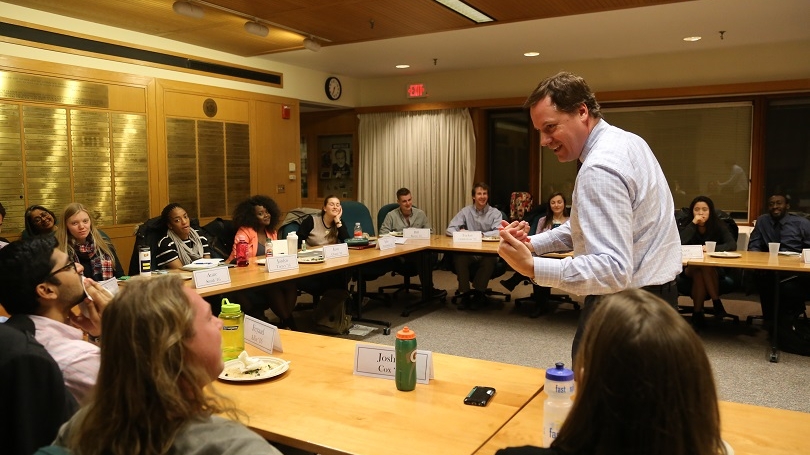
- Public Policy
- Leadership
- Funding
- News & Events
- About the Center
Back to Top Nav
Back to Top Nav
Back to Top Nav
Back to Top Nav
The RLF session on February 4, 2016 was led by David Ager, Senior Fellow in Executive Education at Harvard Business School. The session focused on the Rob Parson Morgan Stanley case study. The premise was that Morgan Stanley had introduced a new performance management system in order to transform its culture to a One-Firm firm. In the case, Paul Nasr, a senior management director has to decide whether or not to promote Rob Parson to the Managing Director position. The case included a range of exhibits related to Rob Parson’s performance. Rob was a strong revenue producer – helping to bring Morgan Stanley’s market share from 12.2% from 2%. The downside was Rob’s interpersonal skills – he was described as aggressive and tended to work individually instead of cooperatively.
The session began with a discussion of our thoughts on whether Rob should get the promotion or not. 16 RLFers said ‘No’ while 4 said ‘Yes.’ We brainstormed and recorded all of the reasons that we thought he should or should not get the promotion. We also talked through what would be the possible risks for promoting him and what would be the risks for not promoting him. To end the exercise of thinking through this case, we were broken up into groups of three – one person played Rob Parson, one played Paul Nasr and one observed. The Paul Nasrs then had to tell the Rob Parsons that they were not getting the promotion. After this painstaking but revealing interaction, we discussed how we each went about expressing the bad news. Some of us began with a compliment, others were very straightforward, and some emphasized that it was a group, not individual, decision.
This led into going over the important parts of managing performance and conveying feedback. One takeaway from this was that both sides have to have a role in setting expectations for a promotion. Additionally, it is crucial to remember that the purpose of giving feedback is not to tell someone what they are doing wrong. Instead, it is to enable a person to make themselves more effective. Overall, one of the most important messages from the session was that the best leaders are the ones who have a robust toolkit for managing performance and giving feedback so they can adapt their style to the situation and/or person.
-Written by Feyaad Allie '16, Rockefeller Leadership Fellow